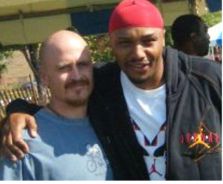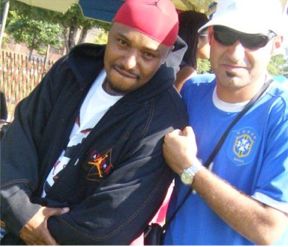I found myself last weekend at the National Hip Hop Political Convention in Chicago of all places. I’m apolitical and while I love music, I’m not any more partial to hip hop than other genres of music. So what was the #$#(*Y^%# was I doing there?
A graduate of the Vision Force Boot Camp called me about a week before the event, telling me I needed to be there and that he would try to get me a spot to speak. He knew the event organizer and we’d gotten a verbal commitment to have me speak. So I came prepared to share about my experience with youth in Kenya, the global influence of hip hop that I witnessed, and how hip hop can be a medium which gives a positive voice for personal and societal change to the rising generation.
It was about 3 months ago that I became a big YES to almost any and all speaking opportunities. I simply got clear that the Vision Force message must be heard–NOW. Since then, my life has altered dramatically. From speaking to local high schoolers to traveling to work with youth in Kenya, we’re bringing the Vision Force message to the world any way we can.
Most recently I was in Chicago at the National Political Hip Hop Convention. It was very much a gathering of revolutionaries–both old and new. Let me explain…
Old school revolutionaries are those who stake out a position in relation to an opposing party, and seek to change reality by defeating the other side. Often these old school revolutionaries are violent and short-lived. Their weakness lies in their approach to change. I call people who approach change from a position, positionaries.
The new revolutionaries are visionaries, who operate from a stand instead of a position. Their focus is not on defeating the opposition as much as it’s on creating the world they really want.
At the convention were politically active people of all ages. There were icons from the Civil Rights era, and old school rappers from the 70s and 80s, and youth from today’s hip hop generation. Martin Luther King, Jr., was very much a visionary in his approach to change. He didn’t just have a dream, he had a vision.
The convention was largely focussed on rallying and organizing hip hop artists and fans to take political action for social justice her in the U.S. Hip hop as a medium. Hip hop as a movement.
As impassioned and committed as most of the convention attendees were to causing change, I saw several different approaches to change. There were many old school revolutionary methods and new revolutionary methods as well.
While there were people advocating all kinds of strategies for change, from violent to nonviolent, many if not most seemed to share the same underlying assumption that is still found throughout the world in the early 21st Century–that being the view that the power is somehow out there. The assumption that real change happens through political force.
The rapid social, economic and technological change we witness around the world is not the affect of political force, but rather the reduction of political force such that we are freer to use our most powerful resource: the human mind’s ability to think independently and creatively find new solutions for problems in the world, then take action to turn those ideas into reality. In short, it’s vision force.
Consider that vision force is our greatest untapped resource for change and advancement as individuals and as a society. So many of us have been conditioned to follow and obey, and relate to authority as something outside of us. Our relationship to power is an external one, and when we’re not in alignment with the authority or the majority, we often feel as if there is little we can do to positively change our circumstances.
Yet vision force is what is behind all new ideas and acts of creation in the world, from the invention of airplanes to the starting of a business to the very idea of human rights. Political force is the power to stop someone’s actions, to limit someone’s freedom. Vision force is the creative power itself. Each of us possess it. Each of us can utilize it to more effectively change our lives, our circumstances and the world around us.
So one of the weaknesses I see displayed in most organizations that seek to affect social change is the assumption of power being external to us. Sure, we tell people that we can rise up to “fight the power,” but in most people’s minds it really doesn’t occur that we as individuals have much power to affect change. Even the form our ideas for solutions take is within the political force paradigm: if we can get enough people to vote for Proposition 454, for example, then we can force everyone to fund it and obey it.
I won’t belabour his point here, except to say that there is a whole new world of ways to cause change when we recognize vision force, not political force, as the dominant power. Entrepreneurial creations of all kinds are one example of vision force in action.
Yesterday’s revolutionaries symptomatically worship political force as the means to change. To them, taking the power back means regaining political force – either by peaceful or violent means. (Political force at it’s essence though is always violent, whether something is voted on or not. If I’m the government, forcing you to obey a new law and you don’t, I take you to jail. If you resist, I get violent.)
A further problem with political force being one’s major focus for change is that political tactics in today’s system are mostly positionary. Positionary tactics in a democracy usually result in little positive progress for anyone. Such tactics are defensive by nature, and usually result in your opponent have greater resolve to defeat you, even if you wrest temporary power.
This assumption amongst many of the hip hop revolutionaries is not uncommon in revolutionaries the world over. It’s simply worth pointing out.
There were many hip hop revolutionaries at the convention who exhibited visionary methods for change, rather than positionary methods. A brilliant example of such methods is utilizing hip hop as a medium for communicating a new idea or vision to the world in a way that inspires people to take creative action.

I got a chance to meet several conscious hip hop artists who use their artform as a way to awaken others to serious issues and inspire them to action. (Above I’m with conscious artist, Malik Yusef.)
Considering that the young generations are traditionally the change agents, the idealists, the activists, the ones who believe they can still change the world–any medium as far reaching and powerful as hip hop is with today’s youth holds incredible promise for inspiring new positive change in the world. Imagine… if changing the world became… cool! Cooler than pimps and hos. Imagine, if living a visionary life, standing for something and calling your even your enemies to stand beside you became the coolest life to live… cooler than having a pimped out ride. Imagine!
What is still missing for most positive revolutions is ways of communicating that can effectively call even your enemies to stand beside you in cocreating the world you envision. The youth as well as people in general today are largely resigned and cynical about politics and the idea that we can significantly change this world in a positive way. It is visionary concepts and methods for thinking, communicating and living that will change all that. Such concepts can be found in our free Power To Stand course, and intensive training is delivered at our Vision Force Boot Camps.
I didn’t get to speak at the convention this time around, but I did make several promising contacts in the hip hop world, and did record an interview for the documentary roughly on this same subject by Emjed Hammas and 2020 MultiMedia.
Later today, Emjed and I are sailing on Lake Michigan. Visionary wordsmith Malik Yusef may join us.







